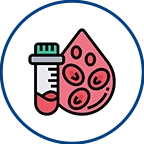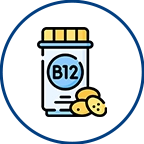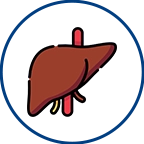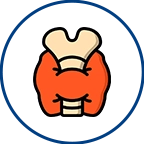Low Blood Pressure

Low blood pressure, also known as hypotension, is a condition characterized by abnormally low levels of blood pressure. It occurs when the force exerted by the blood against the walls of the arteries is lower than normal. While low blood pressure is generally considered favorable, excessively low blood pressure can cause symptoms and lead to complications. This patient educational content aims to provide valuable information about low blood pressure, including its causes, symptoms, and available treatment options.
Home Sample Collection
What causes low blood pressure?
Low blood pressure can be caused by various factors, including underlying medical conditions (such as heart problems, endocrine disorders, or neurological conditions), certain medications (such as blood pressure-lowering drugs or antidepressants), dehydration, blood loss, severe infection (septicemia), nutritional deficiencies, pregnancy, prolonged bed rest, or anaphylaxis (severe allergic reaction).
What are the common symptoms of low blood pressure?
The common symptoms of low blood pressure include dizziness, lightheadedness, fainting (syncope), blurred vision, fatigue, nausea, clammy skin, rapid or shallow breathing, confusion, and cold extremities. Some individuals may experience these symptoms only when they change positions (such as from lying to standing), known as orthostatic hypotension.
When should I seek medical attention for low blood pressure?
It is advisable to seek medical attention if you experience persistent or recurring episodes of low blood pressure accompanied by concerning symptoms, such as fainting, chest pain, severe shortness of breath, or if you have any underlying medical conditions that may contribute to low blood pressure. Additionally, if you are pregnant and experience symptoms of low blood pressure, it is important to consult with your healthcare provider.
How is the cause of low blood pressure diagnosed?
Diagnosing the cause of low blood pressure typically involves a medical evaluation that includes a thorough medical history, physical examination, and possibly diagnostic tests. These tests may include blood tests to assess for anemia or hormonal imbalances, electrocardiogram (ECG) to evaluate heart function, echocardiogram to assess heart structure, and other specialized tests based on the suspected underlying cause.
What are the available treatment options for low blood pressure?
The treatment of low blood pressure depends on the underlying cause and severity of symptoms. In many cases, making lifestyle modifications can help manage low blood pressure. These may include increasing fluid and salt intake, wearing compression stockings, avoiding prolonged standing, and gradually changing positions. In some cases, medications may be prescribed to help raise blood pressure or manage underlying conditions contributing to low blood pressure.
Can low blood pressure be prevented?
While it may not be possible to prevent all cases of low blood pressure, there are measures you can take to help maintain stable blood pressure levels. These include staying well-hydrated, avoiding excessive alcohol consumption, eating a balanced diet, engaging in regular physical activity, and managing underlying medical conditions with the guidance of your healthcare provider.
Are there any self-care measures that can help manage low blood pressure?
Yes, there are self-care measures that can help manage low blood pressure. It is important to stay well- hydrated by drinking plenty of fluids, especially water. Consuming a diet rich in fruits, vegetables, and whole grains can help maintain overall cardiovascular health. Avoiding excessive alcohol consumption and reducing stress through relaxation techniques or exercise may also be beneficial.
Can low blood pressure lead to complications?
In certain cases, low blood pressure can lead to complications. If blood pressure drops too low, it can result in decreased blood flow to vital organs, leading to organ damage or failure. Severe or prolonged low blood pressure may cause fainting or loss of consciousness, increasing the risk of falls or accidents. Additionally, low blood pressure can cause complications during pregnancy or surgery.
When can I resume my normal activities after experiencing low blood pressure symptoms?
The time to resume normal activities after experiencing low blood pressure symptoms may vary depending on the underlying cause and the individual's overall health. It is important to listen to your body and gradually resume activities as you start feeling better. It is advisable to consult with your healthcare provider for specific guidance based on your individual situation.
Can low blood pressure be a sign of a serious medical condition?
Yes, low blood pressure can be a sign of an underlying serious medical condition, especially if it is persistent or accompanied by concerning symptoms. Some conditions that can cause low blood pressure include heart problems, endocrine disorders, neurological conditions, or severe infections. If you have any concerns about your blood pressure or symptoms, it is important to consult with a healthcare professional for proper evaluation and management.
Book Your Slot
Our Locations Near You in Hyderabad
3KM from Banjara Hills
1.9KM from Yusufguda
3KM from Madhura Nagar
5KM from Shaikpet
Profiles
- Cardiac Risk Profile
- Pituitary marker Profile
- Rheumatoid Arthritis Profile
- Dengue Fever Panel
- Lung Cancer Panel 1 Complete Molecular
- Gastroenteritis Screening Panel
- Thyroid Profile (T3,T4,TSH), Serum
- Pancreatic Marker Profile
- STD profile
- Androgen Profile
- Lipid Profile, Serum
- Pancreatic(acute)Profile
- PCOD Profile
Radiology
Pathology Tests
- Glucose Fasting (FBS),Sodium Fluoride Plasma
- Creatinine, Serum
- Glycosylated Hemoglobin (HbA1C)
- Vitamin B12 (Cyanocobalamin), Serum
- Thyroid Stimulating Hormone (TSH) Ultrasensitive, Serum
- Complete Urine Examination (CUE), Urine
- Liver Function Test (LFT),Serum
- Dengue (IgG & IgM), Serum
- Dengue Antigen (Ns1) Rapid, Serum
- C-Reactive Protein (CRP), Serum
- Widal (Slide Method), Serum
- Total IgE, Serum




